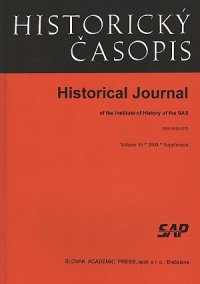Negácia udalostnej histórie a historický optimizmus: historická ideológia Svetozára Hurbana Vajanského (1881 – 1897)
The negation of event history and historical optimism: the historical ideology of Svetozár Hurban Vajanský (1881-1897)
Author(s): Karol HollýSubject(s): History
Published by: SAV - Slovenská akadémia vied - Historický ústav SAV
Keywords: History; ideology; Slovak National party; Svetozár Hurban Vajanský
Summary/Abstract: By analysing selected texts by S.H. Vajanský from the period 1881 – 1897, the author points to his conception of history, in the context of his national ideology and conception of the policy of the Slovak National Party (Slovenská národná strana) at the end of the 19th century. Vajanský’s historical argumentation rests on two different but inter-connected interpretations of national history. The first starts from the concept of the Slovak nobility as an elite group in the society of the Kingdom of Hungary, the only group able to represent the mass of the nation. However, instead of this, it voluntarily “broke its connection with its people”, which is the cause of national poverty. Vajanský, however, did not find any cause for pessimism, but for optimism, thanks to the fact that the role of representing the mass of the nation had been taken up by the national intelligentsia. On this basis, he constructed a second interpretation of national history based on their negation. According to him, the Slovak people remembered “prehistoric times”, but remained untouched by “historic times”, which, in the interpretation of the author, meant event or political history. The negation of event history led to historical optimism – the Slovak nation still had its history in front of it.
Journal: Historický časopis
- Issue Year: 2009
- Issue No: 02
- Page Range: 243-269
- Page Count: 27
- Language: Slovak

